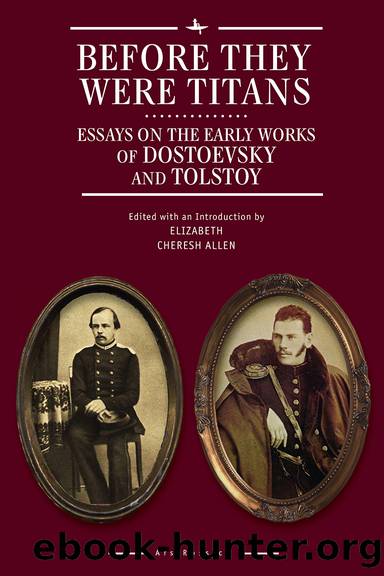Before They Were Titans: Essays on the Early Works of Dostoevsky and Tolstoy by Elizabeth Cheresh Allen

Author:Elizabeth Cheresh Allen
Language: eng
Format: epub
Publisher: Academic Studies Press
Published: 2018-11-06T00:00:00+00:00
VII
Fear and Loathing in the Caucasus: Tolstoyâs âThe Raidâ and Russian Journalism
William Mills Todd III and Justin Weir
Lev Tolstoyâs short work âThe Raid: A Volunteerâs Storyâ [âÐабег: ÑаÑÑказ волонÑеÑа,â 1853] marks a key moment in his early career. The story implicitly compares a young manâs first experience in battle with the challenges of writing literature, riffing on Tolstoyâs own autobiographical methods and underscoring his caustic view of journalism. Although âThe Raidâ was immediately recognized by his fellow soldiers as a barely concealed autobiographical retelling of Tolstoyâs own military experience, modern readers may be puzzled by the apparent flurry of genres in its twelve short chaptersânature descriptions, conte philosophique, and war journalism, in addition to fiction and autobiography. Tolstoy summarizes the simple action of âThe Raidâ in its main title: the volunteer, a first-person narrator, cannot be dissuaded by his captain, named Khlopov, from joining a raiding party against a Chechen village.1 The large, well-armed Russian party takes the village with no resistance, but as the Russians return to the fortress, the Chechens ambush them, fatally wounding a boyish, sentimental Russian officer, Ensign Alanin. Lieutenant Rozenkrantz, a parodically Romantic figure, proves ineffectual, both in battle and in comforting his dying comrade. The remaining Russian officers, except for Captain Khlopov, are remarkable only for their frivolously gallant French phrase-making.
When viewed in light of Tolstoyâs long career, the story is more like an initial foray against the methods and subjects of contemporary literature that would occupy him for many years. Indeed, the real genius of the story lies in its remarkable account of the gestation of an artistic consciousness developing in response to both philosophical and narrative challenges. The subtitle, âA Volunteerâs Story,â captures these dimensions as deftly as the main title summarizes what one would conventionally call its action. Taken together, the titles suggest a work neither naïve nor experimental, despite its seeming simplicity and its set pieces (framing nature descriptions, parodies, meditations on abstract themes).
Tolstoy began writing âThe Raidâ just after he completed Childhood [ÐеÑÑÑво, 1852], and found himself at the proverbial crossroads of an authorial career. Down one well-trod path was military service and a familiar life; should he choose that path, it would be difficult to extract himself from the military commission he had only recently obtained.2 Down the other path was the potential recognition, and possible fame, he might achieve as an author. Here he feared somewhat vainly that he would become just another littérateur, one of the professional journalists whom Tolstoy increasingly despised for their narrow-mindedness and petty squabbles. Todayâs readers know which path he ultimately chose, of course, but as we reread âThe Raidâ we can still discern some of the exciting chaos of these early inextricable aesthetic and professional decisions.3
The first draft of âThe Raidâ was written in 1852, while Tolstoy eagerly awaited word that his first publication Childhood had appeared in the prestigious thick journal The Contemporary [СовÑеменник]. With Childhood in print, Tolstoyâs professional literary ambitions grew, and he resolved to add what would ultimately become âThe Raidâ to a larger series of sketches of military life in the Caucasus.
Download
This site does not store any files on its server. We only index and link to content provided by other sites. Please contact the content providers to delete copyright contents if any and email us, we'll remove relevant links or contents immediately.
The Power of Myth by Joseph Campbell & Bill Moyers(1058)
Half Moon Bay by Jonathan Kellerman & Jesse Kellerman(981)
Inseparable by Emma Donoghue(978)
A Social History of the Media by Peter Burke & Peter Burke(977)
The Nets of Modernism: Henry James, Virginia Woolf, James Joyce, and Sigmund Freud by Maud Ellmann(900)
The Spike by Mark Humphries;(809)
The Complete Correspondence 1928-1940 by Theodor W. Adorno & Walter Benjamin(784)
A Theory of Narrative Drawing by Simon Grennan(775)
Culture by Terry Eagleton(773)
Ideology by Eagleton Terry;(735)
World Philology by(712)
Farnsworth's Classical English Rhetoric by Ward Farnsworth(711)
Game of Thrones and Philosophy by William Irwin(709)
Bodies from the Library 3 by Tony Medawar(708)
High Albania by M. Edith Durham(699)
Adam Smith by Jonathan Conlin(689)
A Reader’s Companion to J. D. Salinger’s The Catcher in the Rye by Peter Beidler(687)
Comic Genius: Portraits of Funny People by(649)
Monkey King by Wu Cheng'en(647)
